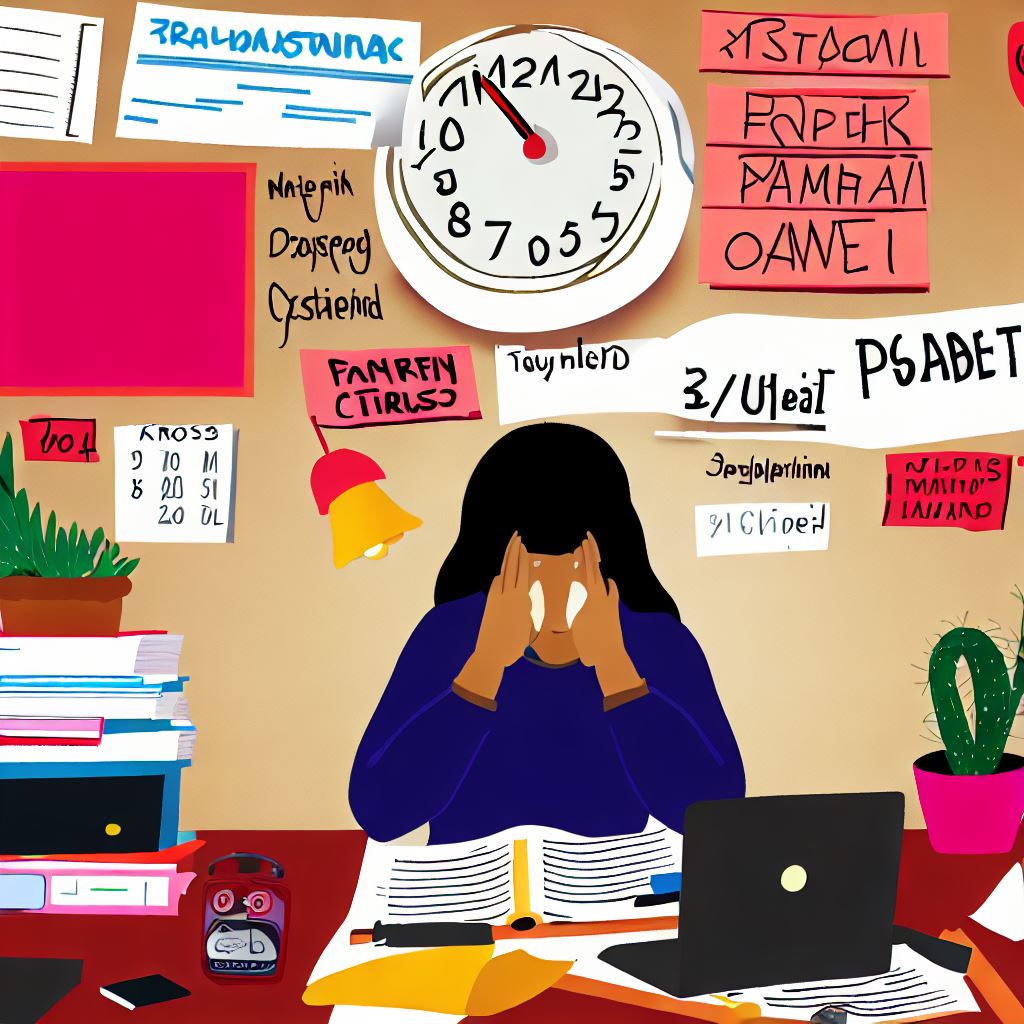
Let’s face it—most students have been there. That creeping guilt of putting off an assignment, promising yourself you’ll start “after one more video,” only to find it’s midnight and you’ve barely opened the textbook. It’s not because you don’t care or you’re lazy. It’s usually because the task feels too big, tedious, or stressful.
You’re not alone. A 2022 study by Steel and Klingsieck found that over 70% of university students regularly delay academic work. The results? Poorer grades, less sleep, and more stress. But here’s the good news: procrastination is a habit, not a permanent flaw. And habits can be changed.
This guide walks you through ten simple, research-backed strategies to beat procrastination. Think of it like a toolkit. Try one or two at a time. See what clicks. Because real change doesn’t come from pressure—it comes from progress.
Table of Content
- What is Procrastination?
- Why Do Students Procrastinate?
- Impact on Academic Life
- Break Tasks into Manageable Chunks
- Use the Pomodoro Technique
- Set Realistic Deadlines
- Eliminate Distractions
- Prioritize Tasks Using the Eisenhower Matrix
- Use Visual Schedules and To-Do Lists
- Practice Self-Compassion and Growth Mindset
- Find an Accountability Partner
- Reward Progress, Not Perfection
- Reflect and Adjust Weekly
- Case Example: Turning It Around
- Key Takeaways
- Conclusion
- FAQs

What is Procrastination?
Procrastination is when you delay doing something important, even when you know that the delay could cause problems. It’s not about being lazy. It’s about avoiding discomfort. Whether it’s fear of failure, confusion about where to start, or stress from too much to do, procrastination is a way of dodging hard feelings.
Psychologist Dr. Tim Pychyl says it best: procrastination is an emotional issue, not a time issue. When a task feels overwhelming or unpleasant, your brain looks for escape routes—like checking your phone or cleaning your desk.
Why Do Students Procrastinate?
Students juggle a lot: assignments, deadlines, social lives, part-time jobs, and more. It’s no wonder procrastination sneaks in. Some common reasons include:
-
Worrying it won’t be good enough
-
Not knowing where to start
-
Feeling overloaded
-
Distracted by phones or social media
-
Believing there’s still "plenty of time"
The American Psychological Association found in 2019 that too much screen time is a major procrastination trigger—it eats up time and increases anxiety.
Impact on Academic Life
Delaying work doesn’t just cause last-minute panic. It affects everything from your grades to your mental health. Research by Tice and Baumeister (1997) showed procrastinators have higher stress levels and lower academic performance.
Other downsides include:
-
Poorer sleep
-
Missed deadlines
-
Lower confidence
-
Strained relationships with teachers or teammates
It’s a cycle—but one you can break.
Break Tasks into Manageable Chunks
Big tasks can feel like cliffs. But if you break them into smaller steps, they feel more like a staircase. Want to write a paper? Start with this list:
-
Choose your topic
-
Find 3 reliable sources
-
Write a rough outline
-
Draft one paragraph
Suddenly, it feels doable. Psychologists call this the "goal gradient effect"—you get more motivated as you see progress.
Use the Pomodoro Technique
Struggling to focus? Try this: set a timer for 25 minutes, work on just one task, then take a 5-minute break. After four cycles, rest for 20-30 minutes.
This method is called the Pomodoro Technique. It works because it creates short bursts of focus that feel manageable. Apps like Focus Keeper and TomatoTimer can help.
Set Realistic Deadlines
Saying "I'll do this later" usually means "I don't want to do this now." Instead, set specific goals with deadlines that make sense.
Use the SMART system:
-
Specific
-
Measurable
-
Achievable
-
Relevant
-
Time-bound
Example: Instead of "Study chemistry," try "Solve 5 practice problems from Chapter 6 between 3:00–3:45 PM."
Research by Locke and Latham confirms that clear goals improve results.
Eliminate Distractions
Let’s be honest—phones are a big part of the problem. Even seeing your phone can lower your brain’s ability to concentrate, according to Rosen et al. (2013).
Here’s what helps:
-
Use a dedicated study space
-
Turn on "Do Not Disturb."
-
Keep your phone in another room
-
Use blockers like Forest or Freedom
Your environment matters. Make it easy to focus and hard to drift.
Prioritize Tasks Using the Eisenhower Matrix
Ever feel busy but not productive? That’s where the Eisenhower Matrix comes in. It helps you decide what matters most:
Urgent Not Urgent Important Do it now Schedule it Not Important Delegate it Let it go
Start with important tasks, even if they’re not urgent yet. That’s where progress lives.
Use Visual Schedules and To-Do Lists
Getting things out of your head and onto a list frees up mental space. Use calendars or task apps to plan your week.
Popular tools include:
-
Google Calendar
-
Notion
-
Trello
-
A simple paper planner
Research by Risko and Gilbert found that "cognitive offloading"—writing things down—boosts productivity and memory.
Practice Self-Compassion and Growth Mindset
Harsh self-talk doesn’t help. Beating yourself up for procrastinating just adds more stress.
Try this instead:
-
Notice your habits without judgment
-
Remind yourself that everyone struggles sometimes
-
Focus on progress, not perfection
Dr. Kristin Neff's research shows that self-compassion reduces anxiety and improves motivation. And Carol Dweck's growth mindset work proves that believing you can improve makes you more likely to try again.
Find an Accountability Partner
Sometimes, we need someone to nudge us. Accountability partners—friends, mentors, or study buddies—can make a big difference.
Ideas that work:
-
Weekly check-ins
-
Shared task lists
-
Study together on Zoom
According to the American Society of Training and Development, people are 95% more likely to reach goals when they regularly check in with someone.
Reward Progress, Not Perfection
If you wait for everything to be perfect before celebrating, you might never get there. Celebrate the small wins.
Examples:
-
Finish an assignment? Go for a walk.
-
Complete your to-do list? Watch an episode.
-
Stay focused for an hour? Treat yourself to a snack.
Positive reinforcement works. It helps you enjoy the process, not just the result.
Reflect and Adjust Weekly
Once a week, take 10 minutes to check in:
-
What went well?
-
Where did I get stuck?
-
What will I do differently next week?
A short journal entry or planner review helps you stay aware and adjust early. It’s like a course correction for your habits.
Case Example: Turning It Around
Rita, a medical student, used to cram the night before every exam. It left her exhausted, stressed, and always behind. She decided to try something new:
-
Broke her study load into daily chunks
-
Used Pomodoro sessions to stay focused
-
Had weekly check-ins with a friend
Within two months, she was sleeping better, finishing her assignments on time, and feeling confident about her exams. The change didn’t come from being more disciplined. It came from changing her system.
Key Takeaways
-
Procrastination is about emotions, not just time.
-
Breaking tasks down makes them less intimidating.
-
Small changes—like timers, lists, or accountability—can lead to big improvements.
-
Be kind to yourself. You’re not the only one figuring it out.
-
Progress matters more than perfection.
Conclusion
Procrastination doesn’t mean you’re lazy or broken. It means you’re human. And humans thrive when we feel supported, seen, and capable.
Try one tip from this list today. Then another next week. Build your own system—not one based on pressure or guilt, but on clarity, rhythm, and kindness.
Because beating procrastination isn’t about forcing yourself to work harder. It’s about learning to work smarter—and treating yourself like someone worth helping.
FAQs
How do I stop procrastinating when I feel overwhelmed?
Start tiny. Write down just one task. Then do the smallest possible step. Action lowers anxiety.
Can procrastination be linked to mental health?
Yes. It can be tied to anxiety, depression, or ADHD. If it’s affecting your daily life, talking to a counselor can help.
Do productivity apps really help?
They can, if you use them with purpose. Apps like Notion or Focus Keeper add structure and reduce distractions.
Is procrastination always bad?
Not always. Everyone delays sometimes. But if it’s making life harder, it's time to find tools that help.
How long does it take to break the habit?
There’s no exact timeline, but most habits form in 3 to 9 weeks. Start with small wins and build from there.


